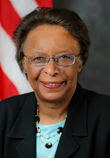
The U.S. National Science Foundation (NSF) is an independent agency of the United States federal government that supports fundamental research and education in all the non-medical fields of science and engineering. Its medical counterpart is the National Institutes of Health. With an annual budget of about $9.9 billion, the NSF funds approximately 25% of all federally supported basic research conducted by the United States' colleges and universities. In some fields, such as mathematics, computer science, economics, and the social sciences, the NSF is the major source of federal backing.
William Julius Wilson is an American sociologist, a professor at Harvard University, and an author of works on urban sociology, race, and class issues. Laureate of the National Medal of Science, he served as the 80th President of the American Sociological Association, was a member of numerous national boards and commissions. He identified the importance of neighborhood effects and demonstrated how limited employment opportunities and weakened institutional resources exacerbated poverty within American inner-city neighborhoods.
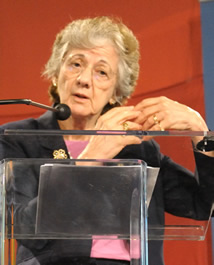
Rita Rossi Colwell is an American environmental microbiologist and scientific administrator. Colwell holds degrees in bacteriology, genetics, and oceanography and studies infectious diseases. Colwell is the founder and Chair of CosmosID, a bioinformatics company. From 1998 to 2004, she was the 11th Director and 1st female Director of the National Science Foundation. She has served on the board of directors of EcoHealth Alliance since 2012.
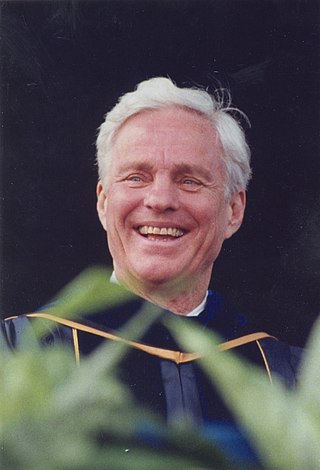
Richard Chatham Atkinson is an American professor of psychology and cognitive science and an academic administrator. He is president emeritus of the University of California system, former chancellor of the University of California, San Diego, and former director of the National Science Foundation.
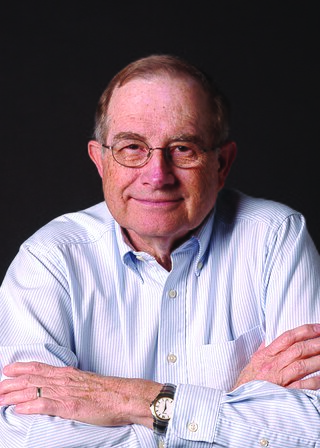
Cornelius Francis "Neal" Lane, is an American physicist and senior fellow in science and technology policy at Rice University's Baker Institute for Public Policy and Malcolm Gillis University Professor Emeritus of Physics and Astronomy Emeritus at Rice University in Houston, Texas.

Science, technology, engineering, and mathematics (STEM) is an umbrella term used to group together the distinct but related technical disciplines of science, technology, engineering, and mathematics. The term is typically used in the context of education policy or curriculum choices in schools. It has implications for workforce development, national security concerns, and immigration policy, with regard to admitting foreign students and tech workers.

Carlos Castillo-Chavez is a Mexican-American mathematician who was Regents Professor and Joaquín Bustoz Jr. Professor of Mathematical Biology at Arizona State University. Castillo-Chavez was founder and the Executive Director of the Mathematical and Theoretical Biology Institute (MTBI) and the Institute for Strengthening the Understanding of Mathematics and Science. For 2019, Castillo-Chavez was Provost Visiting Professor in the Applied Mathematics Division and Data Science Initiative at Brown University. Castillo-Chavez retired from Arizona State University at the end of spring 2020.

Michèle Lamont is a Canadian sociologist who is the Robert I. Goldman Professor of European Studies and a professor of Sociology and African American Studies at Harvard University. She is a contributor to the study of culture, inequality, racism and anti-racism, the sociology of morality, evaluation and higher education, and the study of cultural and social change. She is the recipient of the Gutenberg Award and the Erasmus award, for her "devoted contribution to social science research into the relationship between knowledge, power, and diversity." She has received honorary degrees from five countries. and been elected to the British Academy, Royal Society of Canada, Chevalier de l’Ordre des Palmes académiques, and the Sociological Research Association. She served as president of the American Sociological Association from 2016 to 2017. In 2024, she was elected to the American Philosophical Society.
Steven Ruggles is Regents Professor of History and Population Studies at the University of Minnesota, and the director of the Institute for Social Research and Data Innovation. He is best known as the creator of IPUMS, the world's largest population database. IPUMS provides information about two billion people residing in 107 countries between 1703 and the present, including every respondent to the surviving U.S. censuses of 1790 to 1940. He served as founding director of the Minnesota Population Center from 2000 to 2016. He served as the 2015 President of the Population Association of America, the first historian to hold the position. He also served as President of the Association of Population Centers (2017–2018) and President of the Social Science History Association (2018–2019). He has been active on many national advisory and study committees, including the Census Bureau Scientific Advisory Committee; the National Science Foundation Social, Behavioral, and Economic Sciences Advisory Committee; the National Science Foundation Advisory Committee for CyberInfrastructure; and the National Academy of Sciences Board on Research Data and Information.
Amy Burns Ellis is a Full Professor in the Department of Mathematics and Science Education at the University of Georgia. She was formerly an associate professor in mathematics education in the Department of Curriculum & Instruction at the University of Wisconsin–Madison.
Nilanjana Dasgupta is a social psychologist whose work focuses on the effects of social contexts on implicit stereotypes - particularly on factors that insulate women in STEM fields from harmful stereotypes which suggest that females perform poorly in such areas. Dasgupta is a professor of Psychology and is the Director of the Institute of Diversity Sciences and the University of Massachusetts, Amherst.
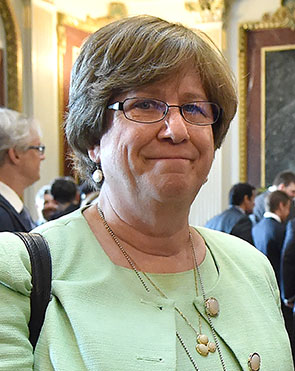
Joan Ferrini-Mundy is an American academic. Her research interests include calculus teaching and learning, mathematics teacher learning, and STEM education policy. She is currently the president of the University of Maine.

Tasha Rose Inniss is an American mathematician and the director of education and industry outreach for the Institute for Operations Research and the Management Sciences (INFORMS).
Georgia Perakis is a Greek-American operations researcher and the William F. Pounds Professor of Operations Research and Operations Management at the Sloan School of Management. She is on leave from serving as Associate Dean of Social and Ethical Responsibilities of Computing at the MIT Schwarzman College of Computing, while serving as John C. Head III Dean at the MIT Sloan school of Management (interim). She is also the Codirector of the MIT Operations Research Center Massachusetts Institute of Technology (MIT), Cambridge, Massachusetts. Her research is primarily in the areas of dynamic pricing, revenue management and inventory control. In 2016, she was elected as a Fellow of the Institute for Operations Research and the Management Sciences (INFORMS) and in 2021 as Distinguished Fellow of the MSOM Society in recognition of her lifetime achievement in "variational inequalities, the price of anarchy, dynamic pricing and data analytics," and her "dedicated mentorship of a future generation of OR scholars."
Nina Matheny Roscher (1938—2001) was an American chemist and advocate for women and minorities in science. She also researched the history of women in chemistry, publishing the book Women Chemists (1995). She served as professor and chair of the chemistry department at American University in Washington, D.C. She received the ACS Award for Encouraging Women into Careers in the Chemical Sciences (1996) and the Presidential Award for Excellence in Science, Mathematics and Engineering Mentoring (1998).
Rae Marie Robertson-Anderson is an American biophysicist who is a Professor and Associate Provost at the University of San Diego. She works on soft matter physics and is particularly interested in the transport and molecular mechanics of biopolymer networks. Robertson-Anderson is a member of the Council on Undergraduate Research.

Willie Pearson Jr. is an American sociologist, who has studied and encouraged the participation of African-Americans and other minorities, as well as women, in science. He has published several books on the experience of African-American scientists with PhDs, including major studies on chemists and engineers. Pearson has had a leading role in many activities and policy development roles in relation to the participation of minorities and women in science, including chairing the Committee on Equal Opportunities in Science and Engineering (CEOSE), a congressionally mandated committee at the National Science Foundation (NSF). He served on the U.S. president's Board of Advisors on Historically Black Colleges and Universities.

Kaye Husbands Fealing is an American economist who is Dean of the Ivan Allen College of Liberal Arts at Georgia Tech. She previously taught for 20 years at Williams College, served in several staff positions with the National Science Foundation, and chaired the School of Public Policy at Georgia Tech. She is a former president of the National Economic Association.

Barbara Lynn Schneider is an American sociologist and education scholar. She is the John A. Hannah Chair and University Distinguished Professor in the College of Education and Department of Sociology at Michigan State University (MSU).
Joya Misra is Professor of Sociology and Public Policy, University of Massachusetts, Amherst.
